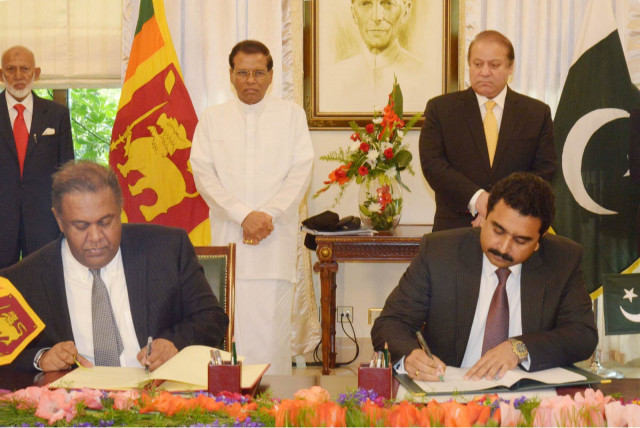Pakistan, Sri Lanka sign nuclear agreement
Details of the agreement were not immediately available but it comes after Sri Lanka signed a pact with India

Prime Minister Nawaz Sharif and Sri Lankan President Sri Sena witness signing of MoUs between the two countries at the PM House on Monday, April 6, 2015. PHOTO: PID
Details of the agreement were not immediately available but it comes after Sri Lanka signed a pact with India in February to build its atomic energy infrastructure, including training of personnel.
Sri Lanka's new president Maithripala Sirisena swept to power in January, ending a decade of rule by Mahinda Rajapakse, and has moved to reduce China's influence in his country, which had irked India.
The Sri Lankan president elaborated the agreements pertained to enhance economic and trade cooperation between the two countries.
“The agreements pertain to advancing cooperation in disaster management, sports, shipping, socio-economic development, education and narcotics control,” he said.
The six MoUs signed are as follows:
1) Cooperation between Pakistan Atomic Energy Commission and Atomic Energy Authority of Sri Lanka
2) Agreement on cooperation against illicit trafficking in narcotic drugs and psychotropic substances
3) Academic cooperation agreement on exchange and collaboration between National Defence University of Pakistan and Lakshman Kadirgamar Institute of International Relations and Strategic Studies of Sri Lanka
4) Collaboration in the field of Sports
5) Mutual cooperation in shipping business between Pakistan National Shipping Corporation(PNSC) and the Ceylon Shipping Corporation Ltd (CSCL)
6) Cooperation on disaster management
Speaking at a press conference with Prime Minister Nawaz Sharif, Sirisena said, "At critical moments in our post-independent histories we have stood in solidarity with each other," adding he was "profoundly grateful for the strong support in the fight against terrorism" by Pakistan.
Pakistan and Sri Lanka have traditionally enjoyed strong ties, particularly over defence, with Islamabad providing military assistance during the war against Tamil Tiger guerrillas that ended in 2009.
Pakistan currently has three operational nuclear plants generating a total of around 740 MW of power and has begun work on two more, including a 2,200-megawatt station to be built with Chinese technical assistance on the Arabian Sea coast at Paradise Beach, 40 kilometres west of Karachi.
Earlier PM Nawaz had spoken of his desire to improve trade and economic relations.
Sirisena will also meet Pakistan's President Mamnoon Hussain during his visit and is due to leave Tuesday.
The Sri Lankan president arrived in Islamabad on Sunday on a three-day state visit and was given a red carpet welcome at the PM House.
A guard of honour was presented to him and the national anthems of both the countries were also played on the occasion.
Read: Sri Lankan president to arrive in Pakistan on April 5 for first state visit
The two heads of states discussed ways to enhance bilateral cooperation in various fields while focusing mainly on trade. Regional and international issues of mutual interest were also part of the discussions.
Read: Sri Lankan president arrives in Pakistan on three-day state visit
This is Sirisena's first visit to Pakistan since becoming the newly elected president of Sri Lanka.



















COMMENTS
Comments are moderated and generally will be posted if they are on-topic and not abusive.
For more information, please see our Comments FAQ